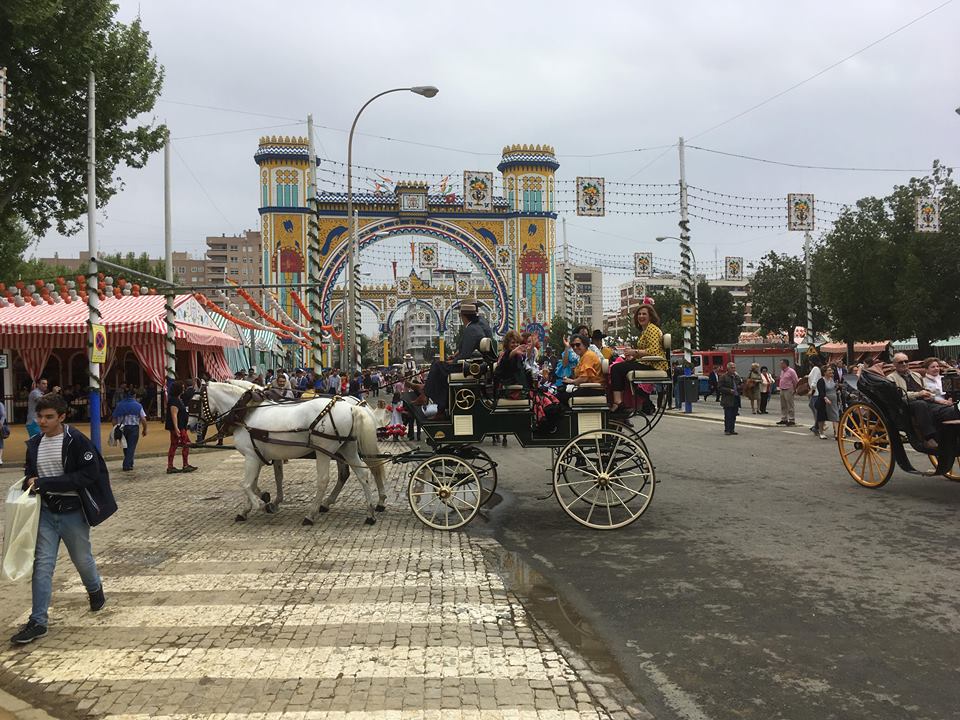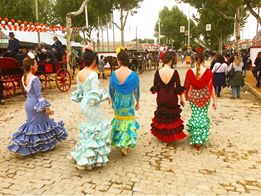Identidad Cultural
12 June 2018One of the things which has been apparent to me here throughout my time in Andalucía is the strong cultural identity which Andalucians possess. They are proud to be Spanish, yet they also define themselves strongly through their regional inhabitance.
Andalucía es muy diferente de las regiones como Cataluña; quien quieren ser independientes y quien no se identifican como Españoles. La realidad es que los andaluces (desde mi punto de vista personal), son los españoles más conocidos en todo el mundo. Aquí se originó flamenco. La siesta es un parte esencial de cada día y la gente comen tapas todo el tiempo.
The cultural identity in Andalucía is further amplified by ´La Feria de Abril´ in Seville and further ferias (both large scale and local) throughout the region. Throughout these celebrations, men wear suits and women don their traditional ´traje de gitana´ dresses, visit the public casetas (or arrange private casetas for groups of friends), drink, eat, dance sevillanas and celebrate.

Creo que estas celebraciones enriquecen la cultura de Andalucía. La feria de abril empiece en los años 1800, así que ahora este festivo tiene casi dos ciento años. Es una de las tradiciones más importantes en toda la región, y en la España moderna es una de los pocos oportunidades en que es posible ver ropa tradicional y una tradición que ha vivido 200 años sin muchos cambios.
Moreover, the Andalucians possess one of the strongest accents in Spain. Consonants at the end (or often in the middle of words) are nonexistent. For example, ´Más o Menos´ (more or less) becomes ´mah o menoh´. This is especially the case in small countryside villages such as the one I work in. The accent could be seen to emphasize the strong cultural identity of the region, as just like in the UK, accents are an instant identifier of where a person is from.
However, alongside the strong cultural identity, it is also possible to argue that Andalucía (in the less tourism based towns and cities), isn´t a hugely diverse place. Migration levels here are not enormous, possibly due to the low employment levels. The point is that most Andalucians possess the ´typical´ Spanish look: Petite, dark hair, dark eyes and olive skin. I myself, being a 6´2 pasty white blonde ´stick out like a sore thumb´ here so to speak. The vast majority of the foreigners who I have met here in Spain are either on their Erasmus placements or doing the same language assistant programme as I am. I teach in a school of around 150 students, of which I would say there are 5 blondes and 1 red haired girl. The rest of my students are Andalucians from Andalucian families and have the perceived looks of a ´traditional´ Spanish person.
Por lo tanto, he dicho que no hay tanta diversidad internacional en Andalucía, pero sin duda hay mucha diversidad entre las regiones distintas en España. La región en que vivo tiene muchas de los estereotipos de los Españoles. Sin embargo, en Cataluña, mucha gente no se identifica como Españoles, pero solo con su región. El norte y el sur tienen culturas opuestas. Además, hay idiomas distintos en comunidades autónomos (euskera en país vasco, catalán en Cataluña, gallego en Galicia etc). Entonces es posible decir que en vez de la falta de diversidad internacional en Andalucía, la diversidad en general en España es clara.

Despite this post beginning describing how Spaniards have very strong cultural identities and how this may result in a lack of diversity, it is actually possible to conclude that this is exactly where Spain´s diversity comes from. The 17 autonomous communities of Spain have got their own identities, traditions, customs and cultures. You are unlikely to the same food from one region to another; if you do it is likely to have been prepared in a totally different way. The very day to day lives of citizens are different, as is the humor and the interpersonal exchanges. It is this diversity which enriches the experience of someone like me who is just in Spain for a temporary time and can see exactly what different things mean to different communities. Spain is an incredibly diverse nation which offers something for everyone.
- August 2021
- March 2021
- January 2021
- December 2020
- October 2020
- April 2020
- March 2020
- February 2020
- January 2020
- December 2019
- November 2019
- October 2019
- September 2019
- August 2019
- July 2019
- May 2019
- March 2019
- February 2019
- January 2019
- December 2018
- September 2018
- August 2018
- July 2018
- June 2018
- May 2018
- April 2018
- March 2018
- February 2018
- January 2018
- December 2017
- November 2017
- October 2017
- September 2017
- August 2017
- July 2017
- June 2017
- May 2017
- April 2017
- March 2017
- February 2017
- January 2017
- December 2016
- November 2016
- October 2016
- September 2016
- August 2016
- July 2016
- February 2016
- October 2015
- September 2015
- August 2015
- May 2015
- March 2015
- February 2015
- January 2015
- December 2014
- November 2014
- September 2014
- August 2014
- July 2014